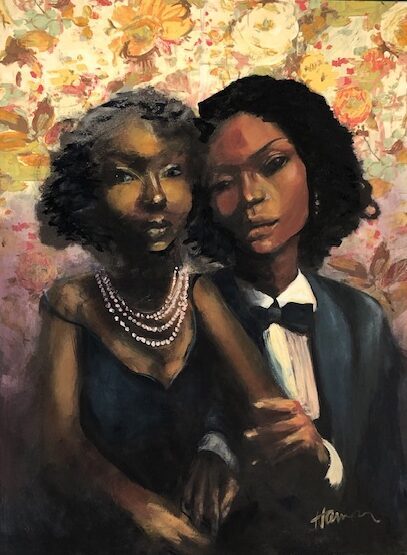The Bostonians

The Bostonians
2024
36 x 48
Acrylic and Oil on Canvas
B.D. Woman’s Blues – Lucille Bogan
Songwriters: Lucille Bogan
A "Boston marriage" was, historically, the cohabitation of two wealthy women, independent of financial support from a man. The term is said to have been in use in New England in the late 19th–early 20th century. Some of these relationships were romantic in nature and might now be considered a gay relationship; others were not.
The song "B.D. Woman Blues" was released by Lucille Bogan under the pseudonym Bessie Jackson on March 7, 1935, by ARC records (number 5-12-58). By 1930, Bogan, along with Bessie Smith and Ma Rainey, were known as "the big three" of the blues scene, and all three sang about sapphic love and desire. In "B.D. Woman’s Blues," Bogan sings about a future where "B.D. women" won't need men. "B.D." stands for "bulldagger" or "bulldyke," Black slang for a butch lesbian. The language for queerness in early 20th-century America was racially distinct; Black women like Jeanne Flash Gray noted that terms like "bulldagger" were not derogatory but were associated with traits like strength and chivalry, while "lesbian" and "homosexual" were terms used for whites.
B.D. Woman Blues (1935)
Coming a time, B.D. women ain't gon' need no men
Coming a time, B.D. womens ain't gon' to need no men
Oh, the way treat us is a lowdown and dirty sin
B.D. women, you sure can't understand
B.D. women, you sure can't understand
They got a head like a sweet angel and they walk just like a natural man
B.D. women, they all done learnt their plan
B.D. women, they all done learnt their plan
They can lay their jive just like a natural man
B.D. women, B.D. women, you know they sure is rough
B.D. women, B.D. women, you know they sure is rough
They all drink up plenty whiskey and they sure will strut their stuff
B.D. women, you know they work and make their dough
B.D. women, you know they work and make their dough
And when they get ready to spend it, they know they have to go
Lucille Bogan
Lucille Bogan was an American classic female blues singer and songwriter, among the first to be recorded. She also recorded under the pseudonym Bessie Jackson. Music critic Ernest Borneman noted that Bogan was one of "the big three of the blues", along with Ma Rainey and Bessie Smith
She would be most prolific in the early 1930s, around the same time that her work became more explicit. It was then that she settled into the type of artistry that let her sing for the LGBTQ audience, sex workers and the woeful, unsatisfied women.
"Sexual references were common in blues recording but the proprieties of the day called for them to be disguised in double entendre form. Bogan made a number of those, but presumably, for the entertainment of the recording staff and friends, she used explicit language in “Till the Cows Come Home” and an alternate take of “Shave ’Em Dry” that makes most hardcore rap lyrics seem tame. Though these were “private” recordings, bootleg pressings made their way into circulation and eventually were transferred to legitimate albums in more permissive modern times." (1)
Her final recordings with Roland and Josh White include two takes of "Shave 'Em Dry", recorded in New York on Tuesday, March 5, 1935. Notorious for its explicit sexual references, a unique record of the lyrics sung in after-hours adult, her songs were recorded either for the fun of the recording engineers, or for "clandestine distribution as a 'Party Record'". Another of her songs, "B.D. Woman's Blues", takes the position of a "bull dyke" ("B.D."), with the lyrics "Comin' a time, B.D. women, they ain't gonna need no men", "They got a head like a sweet angel and they walk just like a natural man" and "They can lay their jive just like a natural man."[6]
She appears not to have recorded after 1935. She managed her son's jazz group, Bogan's Birmingham Busters, for a time, before moving to Los Angeles shortly before her death from coronary sclerosis in 1948.[1] She is interred at the Lincoln Memorial Park, in Carson, California.
In 2022, she was posthumously inducted into the Blues Hall of Fame.[4] The citation noted that "Bogan recorded some of the most memorable blues songs of the pre-World War II era, including some that were landmarks in blues and some that continue to sensationalize her reputation decades after her death".[4]
An excellent resource to better understand the life of Lucille Bogan, I recommend reading the dissertation by Linda Moroziuk - Locating Lucille Bogan: Black Music, the Arts and Socio-Political Opposition in Early 1900's America. The dissertation was prepared for submission to the Faculty of Graduate Studies for the Graduate Program In Music, York University, Toronto, Ontario, November 2017